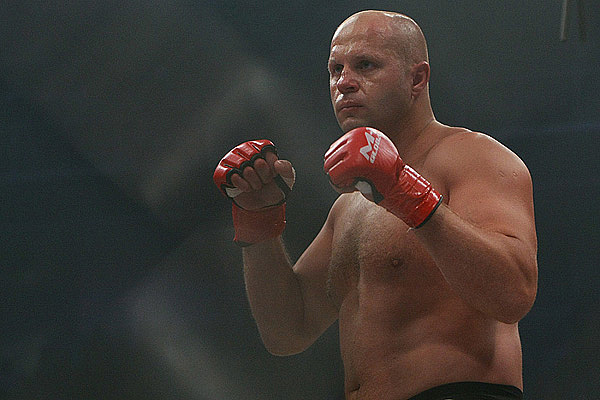Fedor on the Milk Carton
Jake Rossen Dec 24, 2010

Fedor Emelianenko | Dave Mandel/Sherdog.com
Georges St. Pierre fought for a total of 50 minutes in 2010. Anderson Silva fought for nearly as long. Cole Konrad: nearly 70. LeBron James played for upwards of 40 minutes in dozens of games.
Fedor Emelianenko’s total ring time this year: 69 seconds.
Advertisement
M-1’s shelving of Fedor is frustrating for reasons extending beyond financial demands or their sense of worth. It’s provocative because it completely ignores his mortality. Worse, it ignores his place in the sport.
Emelianenko turned 34 in September, hardly Ernest Borgnine
territory but a pretty important number for a man who has fought
professionally in the most physically taxing athletic event
available for over ten years. Neurologically and orthopedically,
MMA fighters suffer the damage equivalent of a car accident far
more often than NASCAR drivers.
In ring years, Fedor is getting old.
MMA is not a sport for drifters. Herschel Walker will have gone a year between fights; Royce Gracie might fight in the summer after a four-year absence; Brandon Vera sat out for over a year while his contract was fought over and never looked the same. It’s a casual attitude for something that reduces you to a primal state, and the results are usually less than impressive. Layoffs kill results and relaxation shouldn’t be part of the curriculum. Either you’re on the circuit or you’re not. By becoming an inaction figure, Emelianenko is altering what he’ll be able to accomplish for the duration of his career.
The slide in skill can be progressive, or it can be sudden. One minute Matt Hughes looks like the most dominant fighter in the welterweight division, and in the next he’s been throttled by St. Pierre and Alves. Chuck Liddell looked ferocious until Quinton Jackson pulled his plug. These are abrupt changes.
We don’t know if Emelianenko experienced that shift during the Fabricio Werdum fight, or if he’s got more in him. Maybe 2010 was his body’s last competitive year; maybe he could’ve taken care of business against Werdum or Alistair Overeem. But because of posturing, there is now a ten-month gap (minimum) for a celebrated fighter than he can never earn back.
I would argue that promoters and management never take a relaxed-state attitude toward contract negotiations. Layoffs cheat the fighter out of opportunities to perform with a capable body and cheat fans the chance to see them hash it out among their contemporaries.
Related Articles






